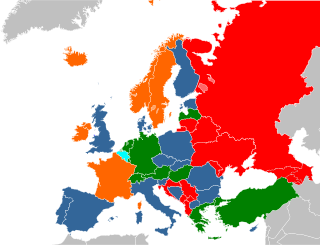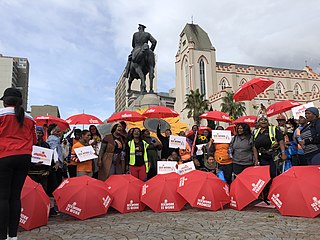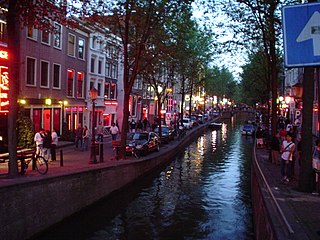Related Research Articles

A sex worker is a person who provides sex work, either on a regular or occasional basis. The term is used in reference to those who work in all areas of the sex industry.

Prostitution in the Netherlands is legal and regulated. Operating a brothel is also legal. De Wallen, the largest and best-known Red-light district in Amsterdam, is a destination for international sex tourism.
Forced prostitution, also known as involuntary prostitution or compulsory prostitution, is prostitution or sexual slavery that takes place as a result of coercion by a third party. The terms "forced prostitution" or "enforced prostitution" appear in international and humanitarian conventions, such as the Rome Statute of the International Criminal Court, but have been inconsistently applied. "Forced prostitution" refers to conditions of control over a person who is coerced by another to engage in sexual activity.
Prostitution in the Czech Republic is legal, but organized prostitution is prohibited. Ever since the Czechoslovak Velvet Revolution (1989) led to the creation of the two independent states Czech Republic and Slovakia, prostitution has been flourishing and has contributed its share to the region's booming tourist economy. Prostitution is widespread in Prague and areas near the Republic's western borders with Germany and Austria. In 2002, the Czech Statistical Bureau estimated the trade to be worth six billion crowns a year. UNAIDS estimate there are 13,000 prostitutes in the country.
Prostitution in Finland is legal, but soliciting in a public place and organised prostitution are illegal. According to a 2010 TAMPEP study, 69% of prostitutes working in Finland are migrants. As of 2009, there was little "visible" prostitution in Finland as it was mostly limited to private residences and nightclubs in larger metropolitan areas.

Robert William Pickton, also known as the Pig Farmer Killer or the Butcher, is a Canadian serial killer, serial rapist, former pig farmer and possible cannibal who is suspected of being one of the most prolific serial killers in Canadian history. After dropping out of school, Pickton left a butcher's apprenticeship to begin working full-time at his family's pig farm. He is believed to have begun his murders in the early 1990s after inheriting the farm. Arrested in 2002, he was convicted in 2007 of the second-degree murders of six women and was also the subject of a lengthy investigation that yielded evidence of numerous other murders.
Prostitution is the business or practice of engaging in sexual activity in exchange for payment. The definition of "sexual activity" varies, and is often defined as an activity requiring physical contact with the customer. The requirement of physical contact also creates the risk of transferring infections. Prostitution is sometimes described as sexual services, commercial sex or, colloquially, hooking. It is sometimes referred to euphemistically as "the world's oldest profession" in the English-speaking world. A person who works in this field is called a prostitute, and sometimes a sex worker, but the words hooker and whore are also sometimes used to describe those who work as prostitutes.
Current laws passed by the Parliament of Canada in 2014 make it illegal to purchase or advertise sexual services and illegal to live on the material benefits from sex work. The law officially enacted criminal penalties for "Purchasing sexual services and communicating in any place for that purpose."
Prostitution was legal in Israel until December 2018, but organised prostitution in the form of brothels and pimping were prohibited. Legislation passed in the Knesset on 31 December 2018 that criminalises the "clients" of prostitutes came into force in May 2020, and was regulated since July 2020 under the Israeli Abolition of Prostitution Consumption Law, where fines will be cast for consumption of prostitution services from an adult. This legislation makes Israel the tenth country to adopt the "Nordic model". The Ministry of Social Affairs and Social Services estimates there to be 14,000 prostitutes in the country.
Prostitution in Luxembourg is in itself legal, and is common, but activities associated with organised prostitution, such as profiting from or aiding prostitution, are illegal. Human trafficking incurs severe penalties. There are estimated to be 300 prostitutes in Luxembourg, most of whom are immigrants.

The legality of prostitution in Europe varies by country.

Prostitution laws varies widely from country to country, and between jurisdictions within a country. At one extreme, prostitution or sex work is legal in some places and regarded as a profession, while at the other extreme, it is considered a severe crime punishable by death in some other places. A variety of different legal models exist around the world, including total bans, bans that only target the customer, and laws permitting prostitution but prohibiting organized groups, an example being brothels.

Canada (AG) v Bedford, 2013 SCC 72, [2013] 3 SCR 1101 is a decision of the Supreme Court of Canada on the Canadian law of sex work. The applicants, Terri-Jean Bedford, Amy Lebovitch and Valerie Scott, argued that Canada's prostitution laws were unconstitutional. The Criminal Code included a number of provisions, such as outlawing public communication for the purposes of prostitution, operating a bawdy house or living off of the avails of prostitution, even though prostitution itself is legal.

Natasha Falle is a Canadian professor at Humber College in Toronto, Ontario, Canada, who was forcibly prostituted from the ages of 15 to 27 and now opposes prostitution in Canada. Falle grew up in a middle-class home and, when her parents divorced, her new single-parent home became unsafe, and Falle ran away from home. At the age of 15, Falle became involved in the sex industry in Calgary, Alberta.
Timea Nagy is a Canadian activist who has spoken on behalf of victims of human trafficking. She founded Walk With Me, a Toronto-based organization that aids survivors of trafficking. Nagy was featured in an anti-trafficking campaign by the Salvation Army in 2009. Her activism has drawn upon her own experience of forced prostitution in Canada.
Bridget Perrier is an activist and former trafficked prostitute who cofounded Sex Trade 101 with Natasha Falle. She became a child prostitute at the age of 12 while she was staying at a group home and an older girl there persuaded her to become a runaway in order to sell sex to a pedophile named Charlie. She had a son, Tanner, who developed cancer as an infant and died at the age of five with the dying wish that his mother get out of the sex industry. In 2000, she moved to Toronto from Thunder Bay, Ontario, Canada. She is the stepmother of Angel, whose biological mother was Brenda Wolfe, one of Robert Pickton's murder victims. In 2009, Perrier accompanied Angel at Toronto's Native Women's Resource Centre for the Sisters in Spirit vigil in remembrance of Wolfe and the other more than 500 Canadian Aboriginal women who have been murdered or gone missing over the past 30 years. In 2010, Perrier picketed a courthouse in downtown Toronto in recognition of International Day of No Prostitution. She was joined by Trisha Baptie, Natasha Falle, Katarina MacLeod, and Christine Barkhouse, all former human trafficking victims. In 2012, after being removed from a news conference relating to Bedford v. Canada, Perrier demonstrated a pimp stick to the media, saying that she had been battered with a pimp stick by her pimp every day that he prostituted her. Perrier opposed the legalization of brothels as proposed in Bedford v. Canada, saying, "Having a legal bawdy house is not going to make it any safer. You are still going to attract serial killers, rapists, perverts." Bridget shared her story in the ground breaking article by Dr. Vincent J. Felitti in Cancer InCytes magazine about how childhood trauma is associated with chronic diseases during adulthood and how child trafficking will eventually worsen the economic burden on civil governance.
Nikki Thomas is the former Executive Director of Sex Professionals of Canada.

The decriminalization of sex work is the removal of criminal penalties for sex work. Sex work, the consensual provision of sexual services for money or goods, is criminalized in most countries. Decriminalization is distinct from legalization.

The Nordic Criminal Model approach to sex work, also marketed as the end demand, equality model, neo-abolitionism, Nordic and Swedish model, is an approach to sex work that criminalises clients, third parties and many ways sex workers operate. This approach to criminalising sex work was developed in Sweden in 1999 on the debated radical feminist position that all sex work is sexual servitude and no person can consent to engage in commercial sexual services. The main objective of the model is to abolish the sex industry by punishing the purchase of sexual services. The model was also originally developed to make working in the sex industry more difficult, as Ann Martin said when asked about their role in developing the model - "I think of course the law has negative consequences for women in prostitution but that's also some of the effect that we want to achieve with the law... It shouldn't be as easy as it was before to go out and sell sex."

Feminist perspectives on sex markets vary widely, depending on the type of feminism being applied. The sex market is defined as the system of supply and demand which is generated by the existence of sex work as a commodity. The sex market can further be segregated into the direct sex market, which mainly applies to prostitution, and the indirect sex market, which applies to sexual businesses which provide services such as lap dancing. The final component of the sex market lies in the production and selling of pornography. With the distinctions between feminist perspectives, there are many documented instances from feminist authors of both explicit and implied feminist standpoints that provide coverage on the sex market in regards to both "autonomous" and "non-autonomous" sex trades. The quotations are added since some feminist ideologies believe the commodification of women's bodies is never autonomous and therefore subversive or misleading by terminology.
References
- ↑ James Stairs (February 2, 2007). "Ex-prostitutes report on serial murder trial". Independent Online . Retrieved October 13, 2012.
- ↑ Patricia Paddey (October 6, 2010). "Legalizing prostitution a failure of compassion". National Post . Retrieved October 13, 2012.
- ↑ Johnson, Lisa (August 9, 2010). "The Price Of Sex". Planet S Magazine. Archived from the original on October 18, 2012. Retrieved October 22, 2012.
- ↑ Grindlay, L (April 21, 2008). "From drugs and sex to a life of hope". The Vancouver Province.
- ↑ "Women still missing from Vancouver amid Pickton convictions". CBC News . December 9, 2007. Retrieved October 13, 2012.
- ↑ "Trisha Baptie". World Without Exploitation. Retrieved 21 March 2021.
- ↑ Salkin, Miné (May 21, 2009). "Buying sex not a sport: Sex work activists". Metro Vancouver. Archived from the original on October 16, 2013. Retrieved October 22, 2012.
- ↑ "Campaign to raise awareness of potential sex trafficking at 2010 Games". CBC News . May 21, 2009. Retrieved October 13, 2012.
- ↑ Baptie speaking at the Langara College Dialogues
- ↑ Connor, Kevin (October 6, 2010). "Former Prostitutes Picket Trade". The London Free Press. Archived from the original on October 6, 2015. Retrieved October 4, 2018.
- ↑ "Should Canada legalize prostitution? New doc explores the debate". The Globe and Mail. Retrieved 2017-01-11.
- ↑ From drugs and sex to a life of hope, The Vancouver Province, April 21, 2008